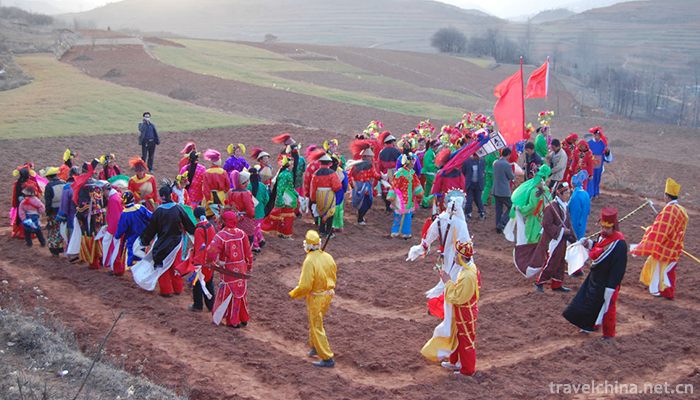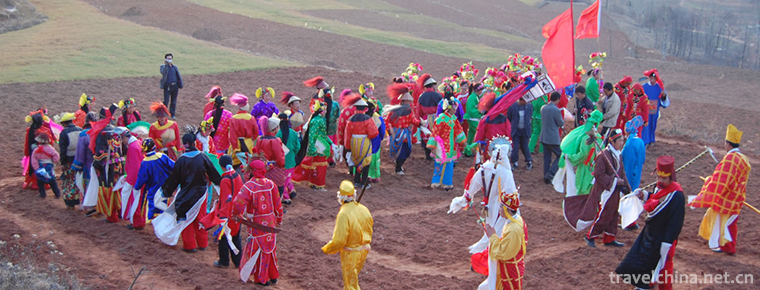Wudu Alpine Opera
Wudu Alpine Opera
Wudu Alpine Opera, also known as Alpine Opera, is one of the two unique local operas in Gansu Province. In 2008, Wudu Alpine Opera was selected as the second batch of national intangible cultural heritage list. The stage performances of "Alpine Opera" are generally divided into "stepping on the stage", "opening the curtain", "playing a small song" and "performing a story". Among them, "performing a story" is the formal content of "Alpine Opera", while other performances such as "Grand Villa", "Shang Temple" and "Walking Print" have obvious characteristics of praying for blessings, entertaining gods and entertaining themselves.
On June 7, 2008, the Wudu Alpine Opera declared by Longnan City of Gansu Province was listed in the second batch of national intangible cultural heritage list with the approval of the State Council. Heritage serial number: 735 IV-134.
historical origin
Alpine Opera originated in Yulong Town, Wudu District, Longnan City, Gansu Province. It mainly spreads in Yulong, Longxing, Jinchang, Longba, Hanwang, Ma Jie, Anhua, Foya, Ganquan, Jiaogong, Chengguan and other towns in Wudu District. It also spreads in Xihe, Lixian, Kangxian, Wenxian and Chengxian counties. Ichthyosaurus and other places belong to alpine and hilly areas, with deep mountains and gullies and inconvenient transportation. Potatoes, corn and wheat are the main agricultural products. Folk activities such as temple fairs, sacrifices and social fires have been prevalent here since ancient times. Alpine Opera is a kind of opera which is bred, evolved and developed from the folk sacrifices and traditional social fires here.
Before 1959, people in Yulong, Longxing and other places called it "storytelling", "going through the stage", "social fire drama" and so on.
In October 1959, it was named "Alpine Opera".
In 1965, it was published in Cihai Art Catalogue, Chinese Traditional Opera Culture and Dictionary of Chinese Traditional Opera Art. In 2008, it was recognized as a national intangible cultural heritage.
artistic characteristics
Stage setting
The stage performances of "Alpine Opera" are generally divided into "stepping on the stage", "opening the curtain", "playing a small song" and "performing a story". Among them, "performing a story" is the formal content of "Alpine Opera", while other performances such as "Grand Villa", "Shang Temple" and "Walking Print" have obvious characteristics of praying for blessings, entertaining gods and entertaining themselves.
Music for voices in a Chinese Opera
Alpine Opera is a kind of opera with opera brand. Its singing tone can be divided into two categories: Huanyin and Shangyin. Alpine operas such as "Huanyin" singing tones as "Gulu", "Ten Fans", "Jinzhuangyuan", "Zhuangyuan Huifu", "Entering Garden", "Menduer", "Taiping Year" and so on are lively, exquisite and beautiful, while "Shangyin" singing tones such as "Carmine Tears", "Rolling White Belt Crying Tune", "Wangge" are haunting and sad.
The language of Alpine Opera is a genuine Wudu dialect, lively and humorous. The Lyric format is relatively fixed, there are seven-character two-sentence couplets, five-character Four-Sentence quintessence, folk song style, rhyme poetry style and so on. A large number of linings and flexible forms of bangqiang constitute the unique singing style of Alpine Opera. The accompaniment instruments of Alpine opera are divided into martial music and literary music. There are big drums, big gongs and four tiles in martial music. The literary music includes "big tube", "earth pipa" and "erhu".
Performing characteristics
The performance of Alpine Opera has the characteristics of "Ba Dance" dancing, rocking, twisting and swinging steps in the social fire arena, but more actions are the reproduction and processing of life and labor by common people's actors. In recent decades, with the continuous participation of cultural artists, their performance level has been significantly improved. Alpine dramas are rich and colorful in content. Most of them have positive significance in promoting benevolence and morality and educating people.
Representational repertoire
Representatives of traditional plays include: Xianyang Bill Collection, Liu Four Bill, Lao Chang Shao, Baiyu Frost, Kangxi Master Bai, Er Jiniang Ugly, etc. Creating plays include "Open Lock", "Hu son-in-law", "Blocking Car", "Lao Xinhong", "Night Escape", "Special Party Fees" and so on.
Inheritance Significance
Alpine Opera has been circulating in Wudu and other places for hundreds of years, and is deeply loved by the people. It is the embodiment of the values and world outlook of the ancient working people, the witness of history and the spiritual food of the local people. The study of mountain opera culture will add new contents to the study of national folk culture and drama culture. Digging, rescuing and protecting Alpine operas can enrich people's cultural life, improve people's cultural quality, and promote the construction of a harmonious society and spiritual civilization.


-
1.Three Parallel Rivers of Yunnan Protected Areas
The three rivers running side by side are Jinsha River, Lancang River and Nujiang River, three rivers originating from the Qinghai-Tibet Plateau, running 170 kilometers from north to south in Yunnan P
Time 2018-12-19 -
2.China Aviation Museum
China Aviation Museum is the first large-scale open aviation museum in China. It is located at the foot of Datangshan, Changping District, Beijing. After many years of closure
Time 2018-12-22 -
3.Zaozhuang Old Street Shuicheng South Shandong
Shuicheng Zaozhuang Old Street in Southern Shandong Province is located in the middle section of Xichang Road in the Central District of Zaozhuang City, Shandong Province.
Time 2019-02-06 -
4.Eight treasures quail
Babao quail is a dish. Its main ingredient is pure quail, etc. Its ingredients are purple quail, lotus seed, etc. Its seasoning is peanut oil, salt, soy sauce and so on. It is made by deep-frying.
Time 2019-03-25 -
5.Baxian Yaochi Party
Baxian Yaochi gathering is a traditional dish in Tai'an, Shandong Province, which belongs to the Shandong cuisine family. Egg white is the main material for Baxian Yaochi gathering.
Time 2019-03-27 -
6.Landscape Architecture in Yangzhou
Yangzhou gardens began in the Western Han Dynasty, flourished in the Sui and Tang Dynasties, matured in the Song and Ming Dynasties, and flourished in the Qianlong Period of the Qing Dynasty.
Time 2019-04-21 -
7.Kazakh Tiermai
Tiermai, which means "short poem" in Kazakh language, usually implies philosophy in the poem in a narrative way to give people inspiration. This kind of poem is widely spread among Kazakh he
Time 2019-05-02 -
8.Lu Opera
Luju opera, formerly known as "pour seven operas", is commonly known as "small opera", "prayer and sacrifice opera", "small pour opera", "small barbaric op
Time 2019-05-15 -
9.Brewing Techniques of Qingxu Old Vinegar
The brewing process of Qingxu aged vinegar is complex. After the main steps of ingredients, steaming, manual turning of solid acetic acid, high temperature fumigation, high density leaching, aging and
Time 2019-06-11 -
10.Taishan Stone Dang Custom
Taishan Stone Dangdang Custom is a relic of ancient people's worship of spiritual stones. Mountain and stone are regarded as personality by myth, which is a typical traditional folk culture that has b
Time 2019-06-18 -
11.Genghis Khan Cheng Ji Si Han
He was a Jin Jin. He was from May 31, 1162 to August 25, 1227. Yeke Mongghol Ulus Khan, outstanding in world history. Politician , Militarist
Time 2019-09-07 -
12.Fobao scenic spot
Fobao scenic spot, located 128 kilometers southeast of Sichuan Province, is located in the southern edge of Sichuan Basin. It is a primeval forest area at the tail of the North vein of Dalou mountain. It covers an area of 380 square kilometers. It has the characteristics of mountain, water, stone and forest. It is a subtropical humid climate with superior natural conditions and well preserved vegetation.
Time 2020-10-16